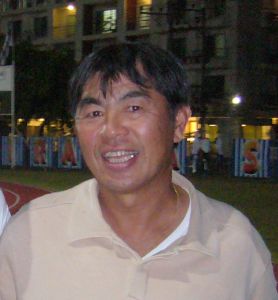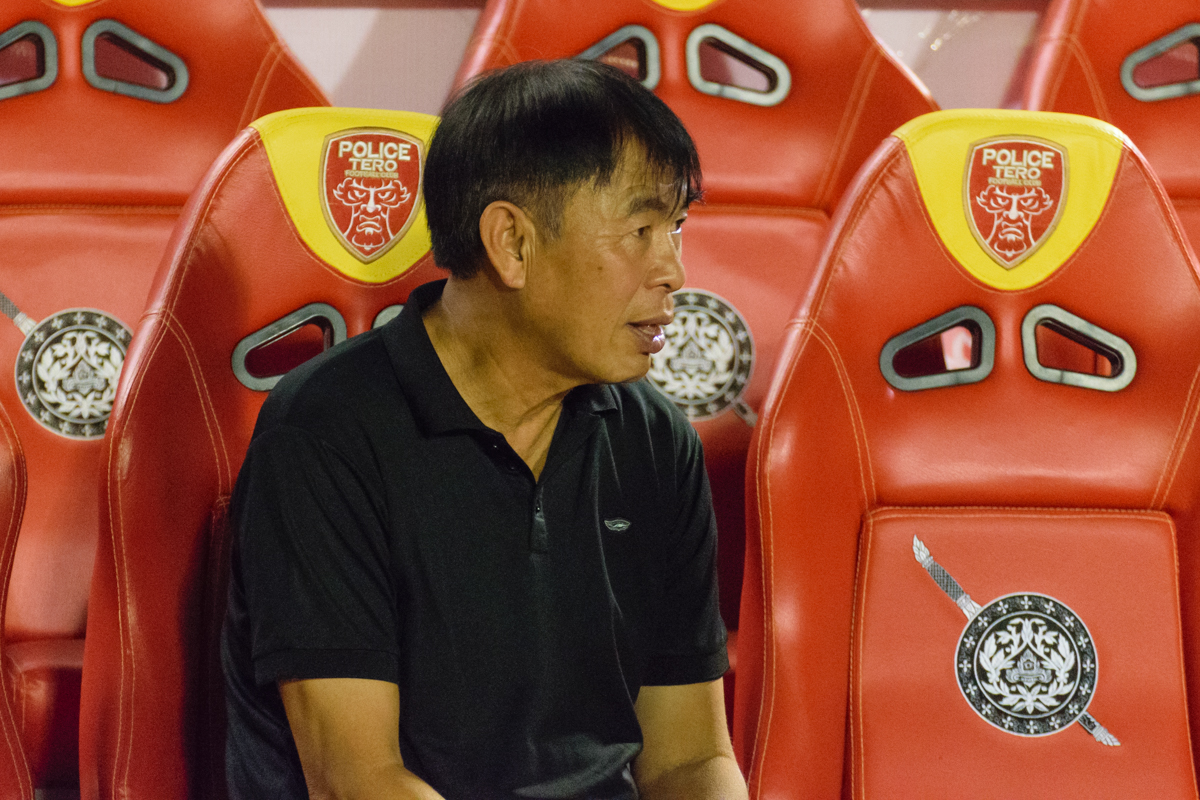1. Overview
Witthaya Laohakul (วิทยา เลาหกุลThai), often known by his nickname "Coach Heng" (โค้ชเฮงThai), is a highly influential Thai football manager and former player. Born on February 1, 1954, in Lamphun Province, Thailand, Laohakul is celebrated for his pioneering career, being the first Thai footballer to play in both the Japan Soccer League (JSL) and the German Bundesliga. His move to Yanmar Diesel in Japan in 1977 marked him as the first Thai player in Japan, and his subsequent transfer to Hertha BSC in 1979 made him the first Thai to play for a European club. Throughout his career, he served as a captain for the Thailand national football team. After retiring as a player, he transitioned into coaching, managing clubs in both Thailand and Japan, and held significant roles as a Technical Director for both Chonburi F.C. and the Football Association of Thailand (FAT). His extensive contributions have profoundly impacted the development of Thai football, opening doors for future generations of Thai players in international leagues.
2. Early Life and Background
Witthaya Laohakul was born on February 1, 1954, in Lamphun Province, Thailand. He is the seventh of fourteen siblings, and his two elder brothers also pursued football careers in the Thai league. His early introduction to football began at a young age, leading him to join Rajpracha at the age of 18. In 1973, representing Lamphun Province, he participated in the 7th Thailand Regional Sports Games in Nakhon Si Thammarat Province, where he not only won a championship medal but was also recognized as the tournament's Most Valuable Player. Before joining Rajpracha, he also played for Hakka FC.
3. Playing Career
Witthaya Laohakul's playing career spanned over two decades, taking him from his native Thailand to groundbreaking stints in Japan and Europe, where he achieved several firsts for Thai footballers on the international stage.
3.1. Playing Career in Thailand
Laohakul began his professional club career in Thailand with Rajpracha F.C., a Bangkok-based football club, which he joined at the age of 18 in 1972. He also played for Hakka FC during his early career. His talent quickly earned him a call-up to the Thailand national football team, making his senior debut on March 15, 1975, in an AFC Asian Cup qualifying match where Thailand defeated Indonesia 3-1. He also participated in the Queen's Cup in 1976. Laohakul was a prominent figure for the national team, serving as its captain and accumulating 61 caps, scoring 18 goals between 1975 and 1985. After his European ventures, he returned to Rajpracha for brief periods in 1984 and 1985.
3.2. Playing Career in Japan
In 1977, Witthaya Laohakul made a historic move to Japan, joining Yanmar Diesel, a transfer that established him as the first Thai footballer to play in Japan. This opportunity arose after he impressed Kunishige Kamamoto of Yanmar Diesel during a match between the Thai and Japanese national teams at the 1976 Merdeka Tournament in Malaysia, where Laohakul scored two goals from free kicks. He officially joined Yanmar in May 1977, though due to Japan Football Association transfer regulations for foreign players, he could not make his official debut until January 1978. His Japan Soccer League (JSL) debut occurred on January 15, 1978, against Mitsubishi Heavy Industries SC. He subsequently became a regular starter, recording 20 appearances, 4 goals, and 2 assists in his first season. He is recognized as the first Asian foreign player in JSL history. During his time in Japan, he was also selected as one of the best 11 players in the Japanese league and was the highest scorer in the Japanese FA Cup with six goals, contributing a total of 14 goals in the Japanese league.
After returning to Thailand for a short period with Rajpracha, he came back to Japan in 1986 to play for Matsushita FC. At Matsushita, he held a dual role as both a player and a head coach. He continued playing until 1990, with his registration being removed after the 8th match of the 1990-91 season.
3.3. Playing Career in Europe
Witthaya Laohakul's career in Europe marked another significant milestone for Thai football. In 1979, he transferred to Hertha BSC in Germany, becoming the first Thai footballer to play in the Bundesliga. His move to Hertha came after his performances for the Thai national team against European clubs like RCD Espanyol and 1. FC Köln caught the attention of German scouts. He made his Bundesliga debut on August 12, 1979, against Fortuna Düsseldorf. During the 1979-80 season, he made three league appearances. Following Hertha's relegation to the 2. Bundesliga, he played in 31 matches over the next two seasons (1980-81 and 1981-82), accumulating a total of 33 league appearances in his three years with the club.
In 1982, he moved to 1. FC Saarbrücken. His time there proved more successful, as he made 54 league appearances and scored seven goals over two years. His greatest achievement with Saarbrücken was winning the Oberliga Südwest (then the German third division) in the 1982-83 season, which secured the club's promotion to the 2. Bundesliga. His impressive performances in Germany earned him the nickname "Thai Boom" from the German media.
3.4. Player Achievements
Witthaya Laohakul's playing career was marked by several significant team and individual achievements.
Team Honors:
- Southeast Asian Games (SEA Games) Champion: 1977
- Southeast Asian Games (SEA Games) Champion (as captain): 1985
- Oberliga Südwest Champion: 1983 (with 1. FC Saarbrücken)
Individual Honors:
- One of the 11 Best Players in the Japanese League
- Highest Scorer in the Japanese FA Cup (6 goals)
4. Coaching Career
Following a distinguished playing career, Witthaya Laohakul transitioned into coaching, taking on various roles in both Japan and Thailand, and later serving as a pivotal technical director, significantly shaping football development in his home country.
4.1. Coaching Career in Japan
Laohakul began his coaching career in Japan in 1988, serving as an assistant coach for Matsushita FC (the predecessor to Gamba Osaka), a role he held until 1995. During his tenure as assistant coach, Matsushita FC achieved notable success, winning the Emperor's Cup in 1990 and the Queen's Cup in Thailand in 1992.
He later returned to Japan to manage Gainare Tottori, a club in the Japan Football League (JFL), which was then the third-highest division. He joined Gainare Tottori as head coach in 2007 under manager Yoji Mizoguchi. In August 2007, he was promoted to manager after Mizoguchi resigned due to poor team performance. Laohakul managed Gainare Tottori for nearly three years, until February 2010. During his time, he consistently guided the team to upper-table finishes, including two 5th-place finishes in 2008 and 2009, aiming for promotion to the J.League, though they ultimately fell short. His tenure concluded when he resigned on February 1, 2010, due to a severe spinal fracture sustained in a traffic accident in Thailand in December 2009. While managing Gainare Tottori, he also facilitated the transfer of Thai player Adul Lahso from Chonburi F.C. to the Japanese club.
4.2. Coaching Career in Thailand
Upon returning to Thailand, Laohakul achieved significant success as a club manager. From 1995 to 1997, he managed Bangkok Bank F.C., leading them to win the 1996-97 Thailand Soccer League championship and securing qualification for the AFC Champions League. His achievements with Bangkok Bank earned him the prestigious Coach of the Year award in 1997.
He later took charge of Chonburi F.C. from 2004 to 2006. In 2005, he guided Chonburi to win the Provincial League, which resulted in their promotion to the Thai Premier League for the 2006 season. Despite this success, he resigned from Chonburi in 2007. He returned to manage Chonburi F.C. again from 2011 to 2013. During this second spell, he actively sought to strengthen the team by bringing in several Japanese staff members, including coaches Yoshio Kato and Mitsuo Kato, and trainer Yohei Shiraki, as well as players like Kazuto Kushida and Daiki Higuchi. Under his leadership, Chonburi F.C. finished as runner-up in the Thai Premier League in 2011, won the Thai FA Cup in 2010, and secured the Kor Royal Cup four times in 2008, 2009, 2011, and 2012. At the end of the 2013 Thai Premier League season, he resigned from his managerial position to take on the role of technical director for the club.
His coaching career in Thailand also included managing RBAC FC (BMA FC) from 1998 to 1999 and the U-16 Thailand National Team in 2000. Additionally, he coached the U-16 and U-18 teams for Sembawang Rangers FC in Singapore from 2002 to 2003, and the senior team in 2004. He also had a stint as an assistant coach at the University of Nevada in the United States in 2001.
4.3. Thailand National Team Coach
Witthaya Laohakul served as the head coach of the Thailand national football team from 1997 to 1998. During his tenure, he led the national team to a gold medal victory at the Southeast Asian Games in 1997, a significant achievement for Thai football.
4.4. Technical Director Role
Witthaya Laohakul has made substantial contributions as a technical director, focusing on strategic development and youth programs. He first took on the role of Technical Director for Chonburi F.C. in 2010, and again from 2014 to the present, where he currently serves as the President of Technical Development for the club, which competes in Thai League 2.
His influence extended to the national level when he was appointed Technical Director for the Football Association of Thailand (FAT) in 2016, also serving as Vice President of Technical Development. He was removed from this position in 2018 following the U-23 national team's group stage exit at the 2018 Asian Games. However, he was reinstated to the FAT's Thai National Team Strengthening Committee on June 12, 2019. Laohakul played a crucial role in bringing Japanese coach Akira Nishino to manage the Thailand national team, actively advocating for his appointment.


4.5. Coaching Achievements
Witthaya Laohakul's coaching career is marked by numerous team titles and individual accolades, reflecting his significant impact on the clubs and national teams he managed.
Individual Honors:
- Thai Premier League Coach of the Year: 1997 (with Bangkok Bank F.C.)
Team Honors:
- Emperor's Cup Winner: 1990 (as assistant coach with Matsushita FC)
- Queen's Cup Winner: 1992 (as assistant coach with Matsushita FC)
- Thai Premier League Champion: 1996-97 (with Bangkok Bank F.C.)
- Southeast Asian Games Gold Medal: 1997 (with Thailand national football team)
- Provincial League Winner: 2005 (with Chonburi F.C.)
- Thai Premier League Runner-up: 2011 (with Chonburi F.C.)
- Thai FA Cup Winner: 2010 (with Chonburi F.C.)
- Kor Royal Cup Winner: 2008, 2009, 2011, 2012 (with Chonburi F.C.)
5. Personal Life
Witthaya Laohakul is widely known by his nickname "Coach Heng," which translates to "Lucky." Beyond his native Thai, he is notably fluent in Japanese, including the distinctive Kansai dialect, a skill that proved valuable during his extensive playing and coaching career in Japan. He stands at 70 in (177 cm) tall and weighs 154 lb (70 kg).
6. Legacy and Impact
Witthaya Laohakul's legacy in Thai football is profound and multifaceted. His pioneering career as a player, particularly his groundbreaking moves to the Japan Soccer League and the German Bundesliga, opened doors for future generations of Thai footballers to pursue opportunities in international leagues. He shattered barriers, demonstrating that Thai talent could compete on global stages.
As a coach and technical director, he has been instrumental in developing football strategies and youth programs in Thailand. His leadership led to significant club successes, including league championships and promotions, and a gold medal for the national team at the Southeast Asian Games. His continuous involvement in the Football Association of Thailand as a technical director, including his role in the appointment of Akira Nishino as national team coach, underscores his enduring commitment to elevating the standard of Thai football. His career, spanning from a trailblazing player to an influential administrator, has laid a crucial foundation for the sport's growth and international recognition in Thailand.